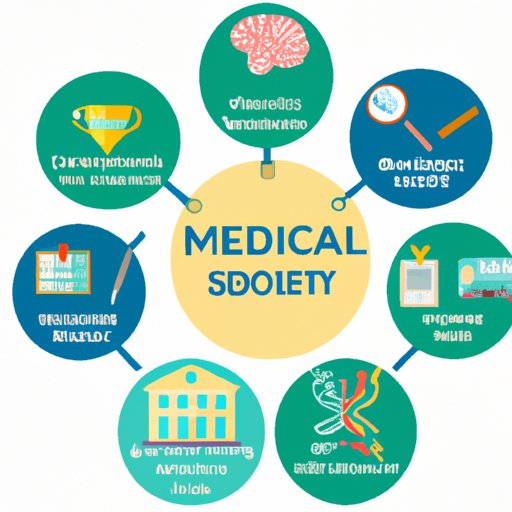
Introduction
Preparing for medical school can be a daunting task, but with proper planning and preparation, you can increase your chances of getting accepted into your dream school. In this article, we will provide you with a comprehensive guide on how to prepare for medical school. From mastering prerequisite courses to securing letters of recommendation, we will cover every aspect of the process to ensure you are fully prepared for the journey ahead.
Step-by-Step Guide to Preparing for Medical School
The road to medical school requires a lot of dedication and hard work. Here are some important steps to take:
Master Prerequisite Courses
Medical schools usually require certain prerequisite courses, such as biology, chemistry, and physics. Take advantage of your college years and excel in these courses. It’s imperative to get good grades in these courses to stand out from other applicants.
Take the MCAT
The MCAT (Medical College Admission Test) is a standardized exam that assesses an applicant’s knowledge of concepts and critical thinking skills. This exam is vital to your application, so make sure to prepare adequately. Consider purchasing review books, taking preparatory courses, and taking sample exams to help you prepare.
Secure Letters of Recommendation
Many medical schools require letters of recommendation from professors and/or healthcare professionals. Start developing meaningful relationships with these individuals early on to ensure that they will be able to write you a strong letter of recommendation. Make sure to give them enough time to write the recommendation and provide them with all necessary materials.
Prepare for Medical School Interviews
Once you have secured an invitation for an interview, start preparing for it. Research the school and its values, practice answering interview questions, and create a list of questions to ask your interviewer. Dress professionally and be on time for your interview.
Study Tips and Tricks for Medical Students
It’s important to develop strong study habits early on in your academic career. Here are some tips for studying efficiently and effectively:
Create a Study Schedule
Develop a study schedule that works for you and stick to it. This will help you stay on top of your coursework and prevent last-minute cramming.
Review Material Regularly
Don’t wait until the night before an exam to review material. Instead, review material regularly to keep it fresh in your mind. Make flashcards or outlines for important topics.
Practice with Sample Questions and Exams
Practice is key to success. Utilize sample questions and exams to help you prepare for exams. This will help you identify areas that require more attention and help you effectively manage your time.
Extracurricular Activities and Volunteer Programs
Extracurricular activities and community service are an essential part of the application process. Here are some tips for getting involved:
Join Medical-Related Clubs and Organizations
Joining clubs and organizations that are related to the medical field can help you gain practical experience, network, and stand out on your application. Look for organizations like the Pre-Med Society or the American Red Cross.
Volunteer in Healthcare-Related Settings
Volunteering in healthcare settings can help you gain hands-on experience, demonstrate your commitment to the field, and show admissions committees that you are a well-rounded applicant. Consider volunteering at hospitals, clinics, nursing homes, or hospice centers.
Selecting the Right Medical School
Choosing the right medical school is crucial to your success. Here are some factors to consider:
Location
Consider where you want to live and what type of lifestyle you want to have. Do you want to be in a big city or a rural area? Do you want to be close to family or friends?
Specializations
Think about what area of medicine you are interested in pursuing. Look for programs with strong specializations in the areas you are interested in.
Admission Requirements
Make sure you meet the admission requirements for schools you are interested in. Some schools may require additional coursework or exams.
Cost
Consider the cost of tuition, room and board, and other expenses. Look for programs with financial aid options or scholarships.
Gaining Practical Experience through Mentorship and Shadowing
Mentorship and shadowing programs are great opportunities to gain practical experience in the medical field. Here are some tips for finding these programs:
Research Programs
Research mentorship and shadowing programs offered in your area. Look for programs that cater to your interests.
Network
Talk to your professors, healthcare professionals, and alumni to connect with potential mentors or shadowing opportunities.
Be Professional
When shadowing or working with a mentor, always be professional. Dress appropriately, be on time, and show a genuine interest in learning.
Financial Resources and Scholarship Opportunities
Medical school can be expensive, but there are funding opportunities and scholarships available. Here are some tips for finding and applying for these programs:
Federal Student Aid
Fill out the FAFSA (Free Application for Federal Student Aid) to apply for federal student aid programs.
Private Loans
Consider private loans from banks or credit unions if federal aid isn’t enough.
Scholarship Programs
Look for scholarship programs that cater to medical students. Check out resources like the American Medical Association or the National Health Service Corps.
Conclusion
Preparing for medical school takes a lot of dedication, hard work, and planning. Use this guide to help you navigate through the process. By mastering prerequisite courses, securing letters of recommendation, developing strong study habits, and getting involved in extracurricular activities, you can increase your chances of getting accepted into medical school. Remember, it’s never too early to start preparing for the journey ahead.




